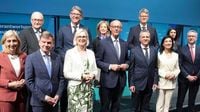In a significant political reshuffle, Friedrich Merz, the leader of the Christian Democratic Union (CDU), has unveiled the designated ministers for his new government, marking a pivotal moment in German politics. Following the recent coalition agreement with the Social Democratic Party (SPD) and the Christian Social Union (CSU), expectations are high regarding the impact of these appointments on the nation’s governance.
On April 28, 2025, Merz and CSU leader Markus Söder presented a lineup that includes some unexpected names, notably Katherina Reiche, who will become the first East German Minister of Economic Affairs. Reiche, a seasoned energy manager and former Bundestag member, is poised to lead the economic agenda at a time when Germany faces numerous challenges in energy and infrastructure.
Nina Warken is set to take over the Ministry of Health, succeeding the SPD's Karl Lauterbach. Warken, who has been a member of the Bundestag since 2013, brings a background in law and politics, although she lacks extensive experience in health policy compared to her predecessor. Her appointment signals a shift in health management as the CDU seeks to address ongoing healthcare issues.
The newly established Ministry for Digitalization and State Modernization will be led by Karsten Wildberger, the head of the Ceconomy Group, which includes major retailers like Media Markt and Saturn. His extensive experience in digital transformation is expected to be instrumental in advancing Germany's digital infrastructure.
Another key appointment is Patrick Schnieder as the Minister of Transport. He is tasked with overseeing a significant portion of the 500 billion euro special fund aimed at renovating Germany's aging transport infrastructure, including bridges and rail networks. This fund represents a crucial investment in the country's future mobility and economic growth.
In the realm of education, Karin Prien will assume responsibility for the newly expanded Ministry of Education and Family. Prien, who has served as the Minister of Education in Schleswig-Holstein, is recognized for her strong stance on educational reform and will play a vital role in shaping educational policy across Germany.
Meanwhile, Lars Klingbeil, the SPD chairman, will take charge of the Ministry of Finance, a move that underscores the SPD's significant influence in the coalition despite receiving only 16 percent of the vote in the recent federal elections. Klingbeil's leadership in finance is expected to steer the country's economic policies in a direction that balances growth and social equity.
Alexander Dobrindt is anticipated to become the new Minister of the Interior, succeeding Nancy Faeser from the SPD. Dobrindt's experience as a former Federal Minister of Transport equips him with the knowledge necessary to handle pressing issues such as migration and internal security.
Other notable appointments include Bärbel Bas as Minister of Labor, Boris Pistorius remaining in his role as Minister of Defense, and Ina Scharrenbach heading the Ministry of Infrastructure. Each of these leaders brings their unique expertise to address the challenges facing their respective departments.
Johann Wadephul is set to lead the Foreign Office, returning this crucial role to the CDU after nearly 60 years. Wadephul, a close confidant of Merz, has been active in foreign and security policy discussions and is expected to strengthen Germany's position on the global stage.
As the CDU and CSU prepare to govern alongside the SPD, the coalition's dynamics will be closely scrutinized. The SPD has managed to secure seven ministerial positions, which some observers view as a surprising success given their electoral performance. This distribution of power reflects the coalition's intention to maintain a balanced approach to governance.
In addition to the cabinet appointments, the SPD plans to announce its ministers following a member survey on the coalition agreement, with expectations set for early May. Merz is slated to be elected Chancellor by the Bundestag on May 6, 2025, marking a new chapter in German politics.
The cabinet's composition is not just a matter of political strategy; it also reflects a commitment to diversity and regional representation. Merz and Klingbeil must navigate various factors, including gender balance and geographic diversity, as they finalize their appointments.
As the new government prepares to take office, the focus will be on how these ministers will implement the coalition's agenda and respond to the pressing issues facing Germany, from economic recovery and digital transformation to social equity and environmental sustainability.
With a mix of experienced politicians and fresh faces, the Merz cabinet aims to address the challenges ahead while maintaining stability in the country's political landscape. The coming months will reveal how effectively this new coalition can work together to achieve its goals and respond to the expectations of the German populace.






